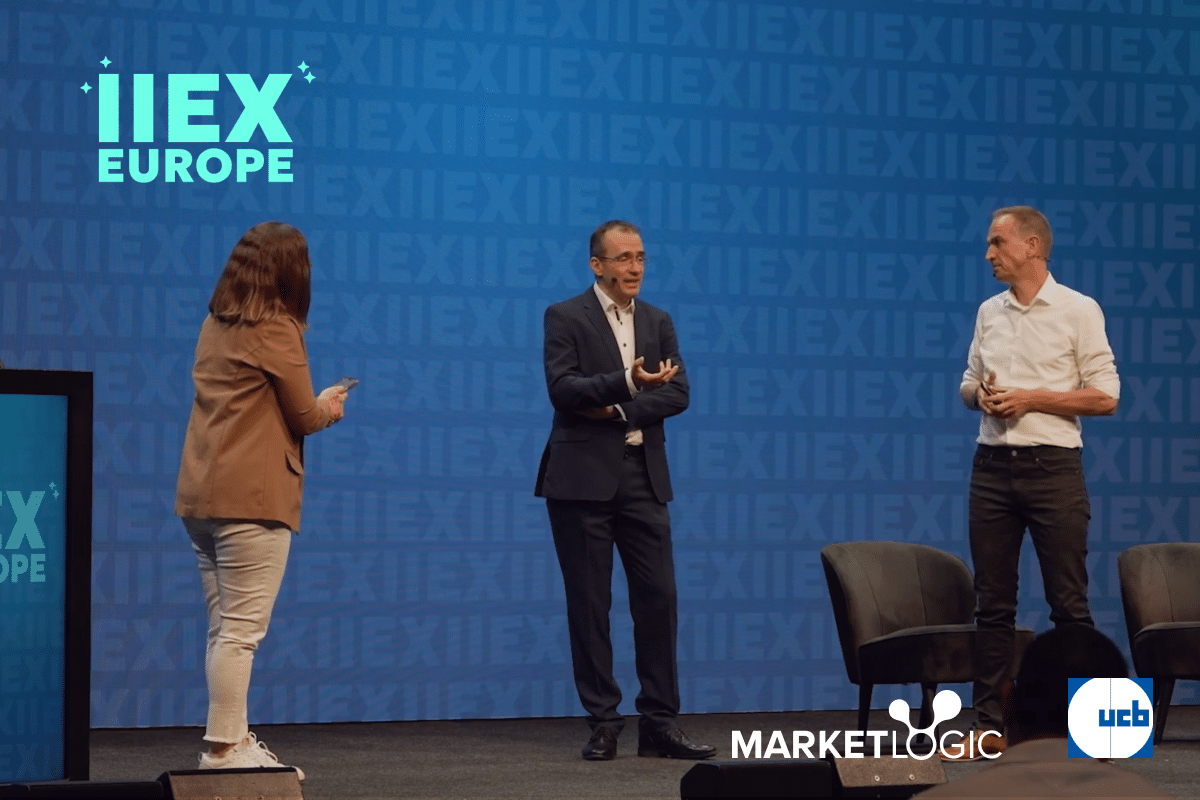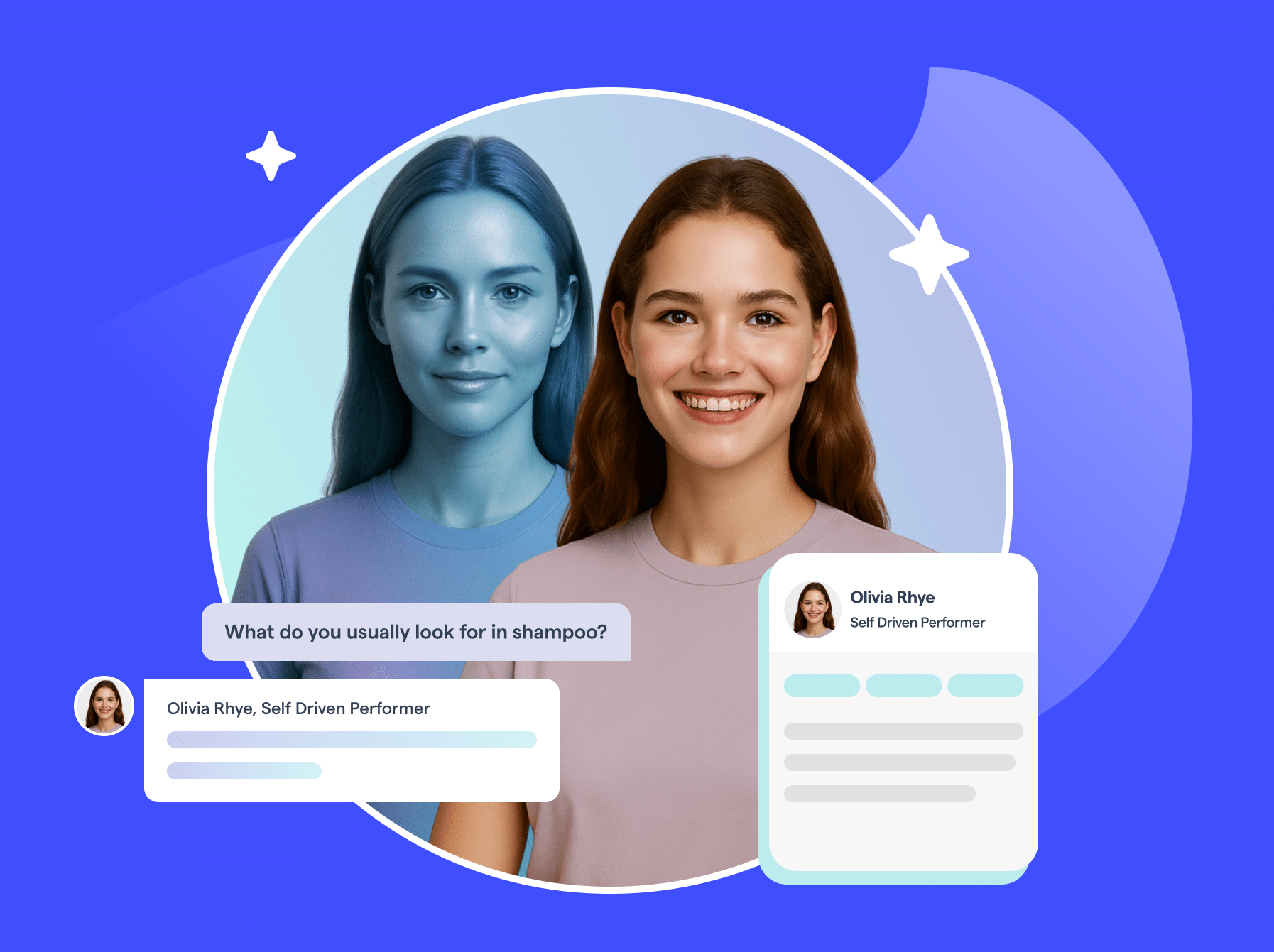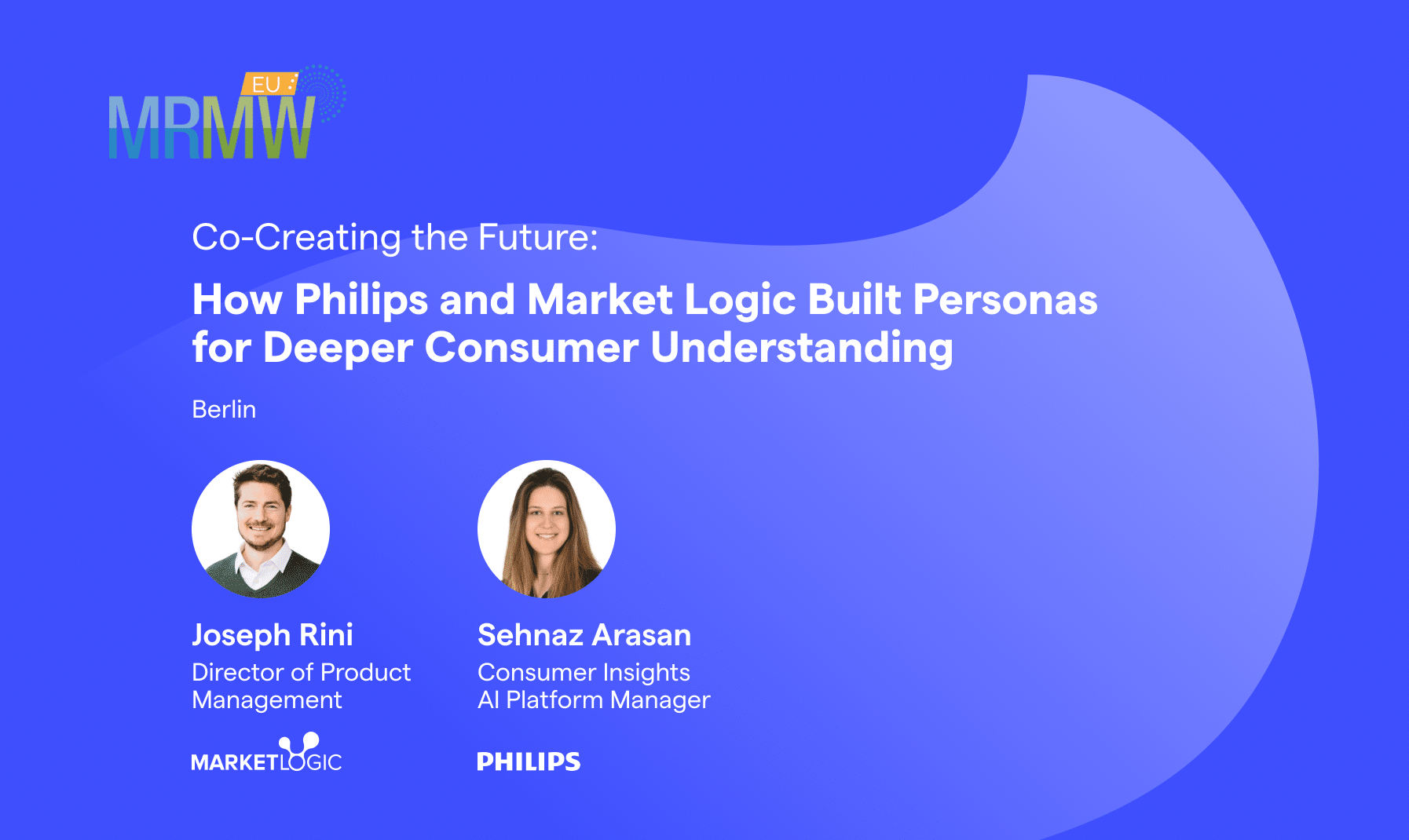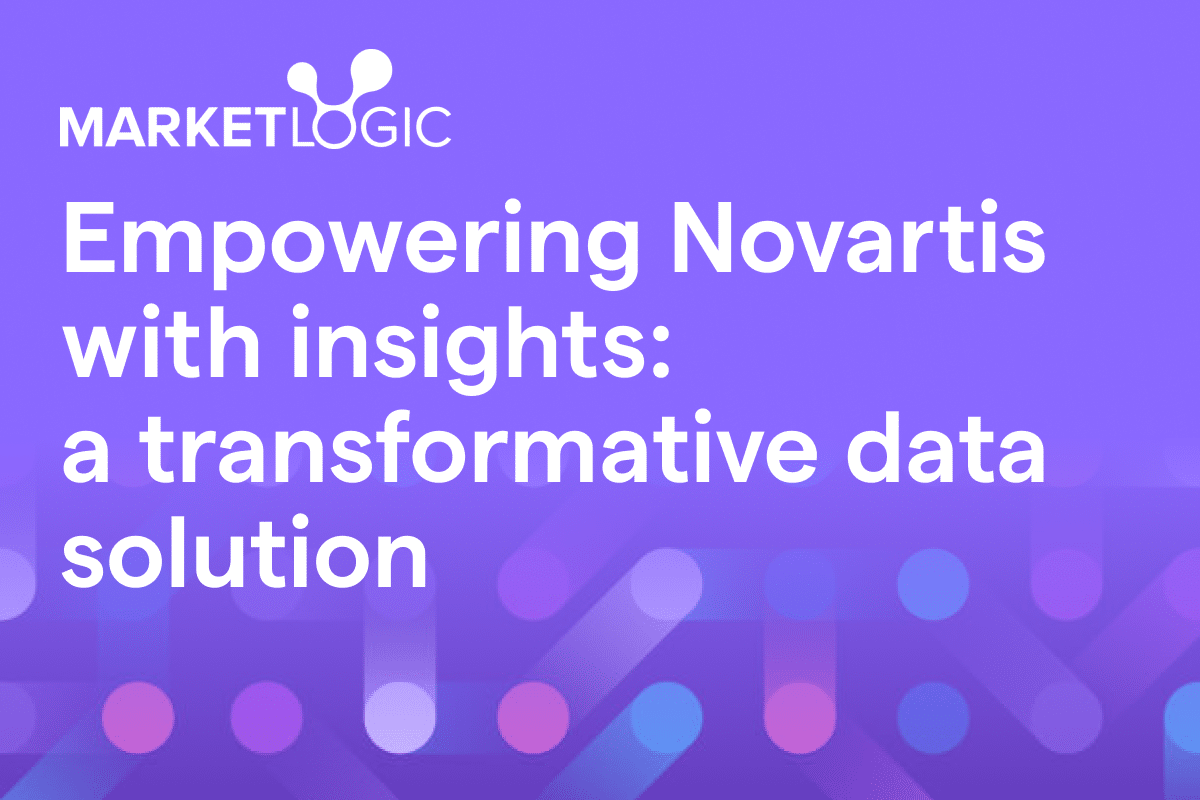Market Logic recently hosted a Healthcare and Pharma-focused edition of its leadership roundtable series in Boston, joined by leaders across the bio-tech, consumer healthcare, and life sciences industries. This event explored how the impact of insights could be scaled across functions to enable better innovation, decision-making, and consumer centricity.
This session was anchored by a number of expert guest speakers that spoke to the current state of market trends, technology, and insights. Attendees heard from:
- Olaf Lenzmann, Chief Innovation & Product Officer, Market Logic Software
- Jackie Ilacqua, Global Head of Syndicated Services and President, Global Oncology, IPSOS Healthcare
- Seth Minsk, Senior Director, Global Insights and Analytics, Women’s Health, Perrigo
- Mary Platts, J.D, Associate Director, Global Compliance & Ops. Excellence – Commercialization, Bristol Myers Squibb
A vision for always-on insights at scale in Healthcare
Olaf Lenzmann set out the urgency of the issue many organizations are dealing with: we’re drowning in data, yet still making many decisions on gut feel. He laid out a plan to turn passive research archives into always-on intelligence agents, enabled by Market Logic’s DeepSights market intelligence and insights platform.
Lenzmann exlpained:
“With on-demand agents, we can use AI proactively in the background to automically and autonimously scan newly added reports, competitive intelligence, internal and syndicated research.”
He continued, “In the past, you would just collect the data, and have it sit in a database until a question arose that would prompt you to go and use that data. Now what you have is a consolidated, curated 360-degree-view on relevant topics sourced from the entirety of your company knowledge that is always current.”
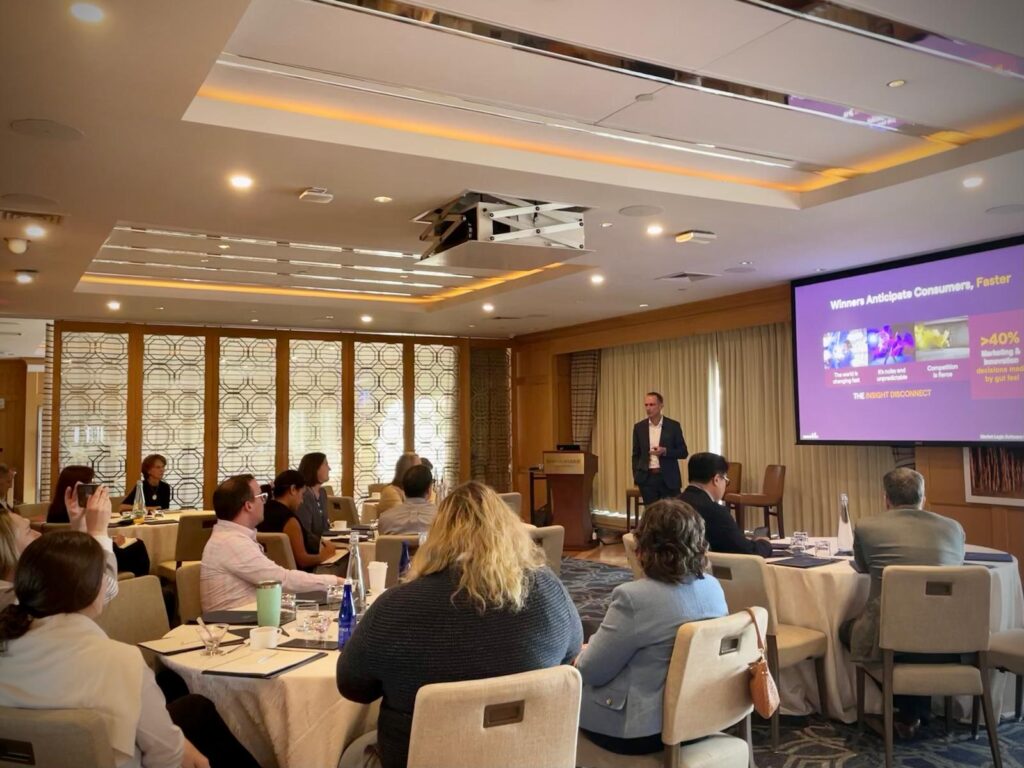
The current state of AI for consumer insights:
- The Challenge: the insights disconnect. Even with huge libraries of data available to them, people make more than 40% of marketing and strategy choices based on intuition or “gut feel”, not because people doubt analytics, but because insights often arrive too late or out of context.
- The Solution: from search to augmentation. Rather than forcing users to hunt through repositories, AI now enables to surface relevant knowledge proactively — nudging instead of waiting.
- The Process: three pillars of AI-powered-Insights: Democratization (access for all), Synthesis (AI-driven distillation), and Automation (continuous curation).
A number of different examples were shared that showed how AI agents could be deployed to address specific use cases for market research and consumer insights teams in the healthcare and pharmaceutical industries.
In a live demo, Olaf illustrated how DeepSights Personas bring consumer understanding to life, allowing individuals to test and iterate product concepts in real-time against their ideal customer profiles of patients, consumers, or healthcare professional (HCPs).
These interactive, virtual personas fuel creative exploration by enabling users to have real-time, natural language conversations through individual or group chats, delivering highly tailored synthetic customer feedback that sharpen teams’ consumer understanding.

Measuring the business impact of adopting AI to expand the use of insights within organisations remains a priority for all insights leaders. Citing Novartis as an example, Lenzmann explained how the company had been able to reduce market research duplication, saving more than $30 million in market research spend after implementing DeepSights. In parallel, Novartis was able to run faster insight cycles, cutting innovation timelines by more than half.
The positive business impact of AI for insights was also validated in a study by Forrester that noted DeepSights contributed directly to business growth while delivering more than 400% return on investment. This further underlines the importance for companies to integrate AI into the intelligence processes in order to remain competitive.
“We’re already seeing how Healthcare leaders are taking this opportunity to use AI to transform the way how insights are being used and embedded throughout their organizations”
Current market trends from the 2025 Ipsos Health Service Report
Jackie Ilacqua provided an overview of critical market trends impacting the healthcare and pharmaceutical industries, sourced directly from the recent 2025 Ipsos Health Service Report.
This annual report quantifies macro shifts in consumer opinion. Based on a global survey of 23,000 respondents across 30 countries, it traces how public sentiment is reshaping health systems, care priorities, and innovation trajectories.
Leading issues in healthcare:
- Top health concerns. Mental health (45%) now edges out cancer (41%). COVID has dropped from mindshare (72% in 2020) to just 6%. Yet obesity and drug abuse still loom large.
- Declining confidence. In countries like the UK, Germany, Canada, and Turkey, perceived system quality dropped sharply. Globally, only 28% believe healthcare quality will improve.
- Affordability and access. 62% say many people can’t afford good healthcare (71% in the U.S.). Wait times, provider shortages, and cost burdens are universal grievances.
- Privacy and trust. Over half worry health data will be misused. Doctors retain more trust than governments, but both are eroding in a world of digital media and polarized narratives.

Issue highlights:
- Mental health is now front and center. 59% say they felt so stressed they “couldn’t cope” in the past year; 76% believe mental and physical health matter equally. Yet only 38% feel systems treat them equally.
- GLP-1 reality check. Awareness is growing (36% globally; 74% in the U.S.), especially among younger, social-media–native groups. Most heard of these drugs from TikTok, not doctors. Benefits (weight, confidence, behavior change) are offset by concerns about long-term use and side effects.
- Vaccine landscapes. 61% globally support compulsory vaccination (52% in the U.S.), yet vaccine fatigue (27%) and resistance (10%) persist. The U.S. experienced 40 measles outbreaks in 2025—even as trust in healthcare incrementally recovered post-COVID.
- Oncology’s still massive—but questioned. With over 2,000 active trials and >2.4M new U.S. cases in 2025, it remains R&D’s center of gravity. Yet Ipsos asks: would you want to know every risk from genomic screening? When everything “causes cancer,” where do you even begin?
With consumer sentiments about Healthcare evolving ever faster, Ilacqua highlighted how AI is helping collect more insights at scale. She recommends methodological fusion of research approaches: blending survey, ethnography, social listening, real-world data —and then synthezising with support of AI.
Customer perspectives on how to deploy and scale AI for consumer insights
In a panel discussion, executives from Bristol Myers Squibb (BMS) and Perrigo shared their lessons learned about implementing AI for insights use cases by adopting DeepSights.
From BMS, Mary Platts grounded the discussion in governance and compliance. At BMS, her team oversees regulatory reporting, audit readiness, and standardization. In 2025, BMS integrated DeepSights into its existing Market Logic consumer insights platform, known internally as Quantum. Her advice: data quality and architecture must come first. AI adoption without clean governance is a house built on sand.
Seth Minsk, speaking from the perspective of Perrigo’s consumer health insights team, shared how Perrigo is leaning into AI for its women’s health business. He emphasized that while the pace is faster than pharma, consumer health still wrestles with fragmented data, fleeting attention, and multi-touch behavior. His implementation of AI tools like DeepSights aim to align innovation closer to real-time consumer sentiment.

Both Perrigo and BMS were both already using a foundational consumer insights and research management platform, on top of which DeepSights was added as a genAI layer to further improve the accessibility and democratization of the data housed in their two platforms.
Speaking from an operations perspective, Platts noted that she advocated with her partners in IT to start with a DeepSights Pilot “so we could sell users on the business case firsthand”.
According to Platts,
“During the pilot I learned that we needed our business users to understand the use cases and drive implementation themselves, rather than rely on a top down approach.”
She continued, “In the past, we’d approached our insights platform from the research management perspective, but we quickly realized this wasn’t how you drive the use of AI.”
Minsk echoed this perspective, but added they were able to get off the ground with AI slightly faster. As a consumer healthcare organization face fewer compliance restrictions and are generally more consumer-led in their go-to-market approach. Additionally, their business users already understand the use case of DeepSights because “Our marketers are already trained to rely on consumer research in how they operate every day.”
According to Seth “the difference in a pure pharma organization versus a more consumer driven organization is the extent to which the understanding of the consumer is so woven into day-to-day business.
He concluded:
“As an insights leader, I don’t want to be answering every question that the marketers have. I want them to be empowered to go in and explore on their own.”
Shared truths from the panel:
- AI is a people challenge, not just a tech one. Governance, accountability, and cross-functional alignment must accompany models.
- Insight activation is the endgame. Outputs must connect to measurable business impact —whether brand metrics, product KPIs, or strategic pivots.
- Training and trust matter. Non-technical users must gain confidence in interpreting AI outputs; otherwise, adoption stalls.
- Humans remain the guardrail. Automation + compliance + oversight can coexist — but only when humans stay in the loop.
Platts reiterated that compliance isn’t “AI’s enemy” — it’s a design principle. Minsk added that insight leaders must speak both in data and in narrative — to marry rigor and meaning.
Ultimately, AI is an accelerator that builds upon your existing consumer and market research capabilities, and puts key insights in the hands of more business stakeholders across the organization. Minsk was clear about how this beiefits his organization explaining,
“DeepSights is the rocket fuel enabler to squeeze the most value out of our consumer insights.”
For Platts too, adopting AI for insights is proving to be a way to overcome previous challenges concluded: “Our main market research pain point was being able to complete everything according to our compliance standards, while also having searchable research that’s accessible and democratized. She concluded:
“Now with DeepSights it’s amazing how many projects, syndicated reports and secondary research at our fingertips, and that’s allowed us to really move forward with this AI journey in a really positive way.”
Want to see DeepSights for yourself? Schedule a demo to see how DeepSights’ always-on insights and our DeepSights Agents are reshaping workflows for pharmaceutical and healthcare insights teams worldwide.



